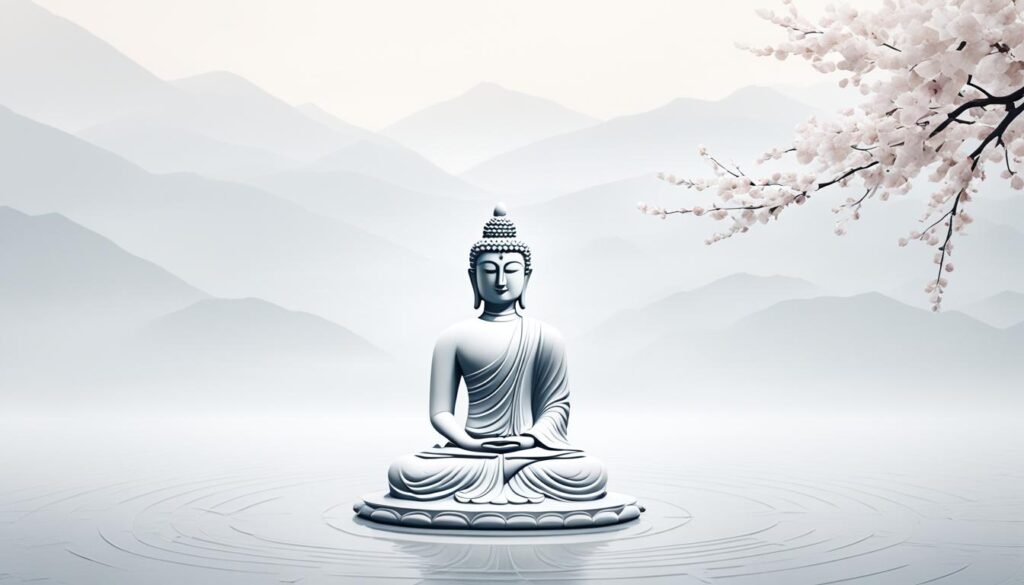Have you ever wondered what lies beneath the surface of your existence? Is there more to life than what meets the eye? Buddhism offers profound teachings on emptiness, a concept known as “sunyata” in Mahayana Buddhism, that challenge our conventional beliefs about reality. Emptiness does not imply a void or nothingness, but rather, the absence of inherent, independent existence.
So, what does it mean to unlock your potential through Buddhism emptiness? How can understanding and practicing emptiness meditation lead to personal growth and profound peace? Join us as we delve into the depths of emptiness in Buddhism and discover how it can transform your perspective and unlock your true nature.
Key Takeaways:
- Buddhism teaches that emptiness is not nothingness, but the absence of inherent, independent existence.
- Embracing the philosophy of emptiness allows us to transcend dualistic thinking and cultivate a deeper understanding of reality.
- Emptiness meditation is a powerful practice that helps us directly experience the interconnected nature of all things.
- Understanding emptiness challenges the notion of separateness and fosters a sense of interconnectedness with all beings.
- By exploring emptiness, we can unlock our potential, cultivate wisdom and compassion, and live with profound peace and fulfillment.
Embracing the Philosophy of Emptiness in Buddhism
Buddhism’s philosophy of emptiness highlights the profound interconnection and interdependence of all things. It teaches that phenomena lack inherent, self-sustaining substance and are essentially empty of independent existence. By embracing this philosophy, you can transcend conventional dualistic thinking and cultivate a perspective that recognizes the dynamic and interrelated nature of reality.
In Buddhism, emptiness is not a state of nothingness but rather a profound understanding that shapes our perception of the world. It is through this understanding that the ultimate reality of Buddhism is realized, leading to personal and societal harmony.
The concept of emptiness challenges the notion of an enduring, unchanging self and the attachment to fixed identities. It urges you to recognize the impermanent and fluid nature of all things, including yourself. By embracing emptiness, you can let go of rigid concepts and cultivate a flexible and open-minded approach to life.
This philosophy invites you to move beyond the limitations of ego and ego-centric desires, enabling you to cultivate wisdom, compassion, and insight. It allows you to see the interconnectedness of all beings and the interdependence of their experiences. By understanding that everything arises dependently, you can develop greater empathy and a sense of shared responsibility towards the well-being of all.
The philosophy of emptiness in Buddhism offers a profound shift in perspective, encouraging you to look beyond the surface appearance of phenomena and recognize their transient and interdependent nature. It invites you to embrace the interconnectedness of all things and experience the ultimate reality of unity and harmony.

Embracing Emptiness in Daily Life
Embracing the philosophy of emptiness in Buddhism extends beyond intellectual understanding. It is about integrating this profound insight into your daily life and transforming your relationship with yourself, others, and the world around you.
Here are some practical ways to embrace emptiness on a daily basis:
- Letting go of attachments: Recognize that clinging to possessions, relationships, and identities can lead to suffering. Practice letting go and cultivating a mindset of non-grasping.
- Cultivating mindfulness: Develop a present-moment awareness that allows you to observe your thoughts, emotions, and sensations without judgment or attachment. Embrace the impermanence of each moment.
- Cultivating compassion: Recognize the interdependence of all beings and extend compassion to yourself and others. Practice acts of kindness and engage in activities that promote the well-being of others.
- Transcending dualistic thinking: Move beyond the limitations of dualistic thinking that categorizes experiences as good or bad, pleasant or unpleasant. Embrace the fluidity and non-duality of existence.
By incorporating these practices into your daily life, you can deepen your understanding of emptiness and experience the transformative power of this philosophy.
Exploring Emptiness Meditation and Buddhist Teachings
Emptiness meditation holds a central place in Buddhist practice and offers a transformative path to self-discovery and enlightenment. By contemplating the nature of emptiness, practitioners delve into the profound teachings of Buddhism and directly experience the interconnectedness of all phenomena.
During emptiness meditation, individuals learn to observe the impermanent and interdependent nature of reality, including the illusionary perception of the self. This practice challenges the conventional notion of a fixed, independent self and unveils a deeper understanding of our true nature.
By engaging in this form of meditation, you embark on a journey of self-inquiry and exploration. As you sit in stillness and observe the nature of emptiness, you cultivate a heightened awareness of the transient nature of all things.
Buddhist teachings provide invaluable guidance and insights on the concept of emptiness, allowing practitioners to deepen their practice and gain wisdom. These teachings emphasize the interconnectedness and interdependence of all phenomena, illustrating how everything is intricately woven together in the tapestry of existence.
Your journey through emptiness meditation and Buddhist teachings equips you with the tools to cultivate wisdom and compassion in your daily life. By understanding the true nature of emptiness, you gain a broader perspective on the transient nature of happiness, suffering, and the world.
Embracing the wisdom of emptiness, you learn to navigate the complexities of modern life with clarity and equanimity. The teachings offer practical guidance on finding inner peace, developing empathy, and addressing the challenges of the human condition.
Table: Emptiness in Buddhist Teachings
| Teaching | Key Insight |
|---|---|
| The Heart Sutra | Emphasizes the emptiness of all phenomena, revealing their true nature |
| Nagarjuna’s Madhyamaka Philosophy | Explores the concept of emptiness to unravel the nature of reality |
| Dzogchen Teachings | Reveals the innate emptiness and luminosity of the mind |
| Zen Buddhism | Invites direct experiential realization of emptiness through meditation and profound inquiry |
Through emptiness meditation and Buddhist teachings, you embark on a transformative journey of self-discovery and awakening. The practices and insights you gain provide a profound framework for navigating the complexities of modern life with wisdom, compassion, and inner peace.

Understanding the Concept of Emptiness in Buddhism
In Buddhism, the concept of emptiness challenges the notion of a permanent, unchanging essence that we often perceive in the world. Emptiness refers to the absence of inherent, independent existence in all phenomena. It is a fundamental principle that underlies the teachings of Buddhism and offers profound insights into the nature of reality.
Contrary to what the term may suggest, emptiness does not imply a state of nothingness. Instead, it invites us to transform our understanding of form and recognize the true nature of existence. Emptiness reveals that all things are interconnected and lack inherent existence on their own.
Through the understanding of emptiness, we come to realize that the conventional distinctions and boundaries we assign to things are mere constructions of the mind. This perspective allows us to see through the illusion of separateness and perceive the deep interdependence that exists between ourselves and all beings.
By embracing emptiness, we can cultivate a profound sense of interconnectedness with the world around us. This understanding opens the doors to compassion, empathy, and a heightened awareness of our impact on others and the environment.
The Ultimate Reality of Buddhism
The concept of emptiness in Buddhism leads to the understanding of the ultimate reality. This ultimate reality transcends the limited view of an independently existing self and encompasses the interconnected web of existence.
Ultimate reality in Buddhism is the recognition that everything is interdependent and constantly changing. It is the understanding that there is no fixed essence or inherent existence underlying the phenomena we perceive.
When we grasp the ultimate reality of emptiness, we free ourselves from clinging to fixed identities and forms. This liberation from attachment and ego brings about inner peace, wisdom, and genuine compassion for ourselves and others.

The image above captures the essence of emptiness in Buddhism, visually representing the interconnected nature of all things. Just as the waves in the ocean are interconnected and inseparable, so too is the web of existence.
The Power of Emptiness in Buddhist Practice
Emptiness is not merely a philosophical concept but a powerful tool for personal transformation. It forms the basis of meditation techniques that help individuals deepen their understanding and experience of emptiness.
Through emptiness meditation, practitioners delve into the nature of reality and examine the empty or essenceless nature of all phenomena, including the self. This practice allows individuals to transcend limited views, dissolve attachments, and gain insight into the interconnected nature of existence.
As we cultivate a direct experience of emptiness through meditation, we develop wisdom and compassion. We begin to see beyond surface appearances and penetrate the truth of interconnectedness that pervades everything.
Ultimately, the concept of emptiness in Buddhism offers us a path to inner freedom and liberation from suffering. It guides us to recognize the impermanent and interdependent nature of existence and to live with deep compassion, wisdom, and profound peace.
Conclusion
The teachings of Buddhism on emptiness offer profound insights and practices that can bring about powerful transformations in both personal and societal levels. By embracing the philosophy of emptiness, exploring emptiness meditation, and understanding the concept of emptiness, you have the opportunity to unlock your true potential and cultivate wisdom, compassion, and inner peace.
Buddhism teaches that the ultimate reality lies in the interconnected nature of all things. Understanding this interconnectedness allows you to transcend conventional thinking and embrace a perspective that recognizes the dynamic and interrelated nature of reality. By doing so, you can create a deep sense of harmony and alignment within yourself and with the world around you.
Through the profound wisdom of Buddhism’s teachings on emptiness, you can uncover your true nature and live a life filled with profound peace and fulfillment. The path to personal growth and creating harmonious communities begins with embracing emptiness, exploring emptiness meditation, and cultivating an understanding of the interconnectedness of all things. In doing so, you tap into the immense potential within yourself and contribute to the flourishing of a more compassionate and enlightened world.
FAQ
What does emptiness mean in Buddhism?
Emptiness in Buddhism refers to the absence of inherent, independent existence in all phenomena. It is not nothingness but rather the understanding that all things lack intrinsic, self-sustaining substance. Embracing emptiness allows individuals to transcend dualistic thinking and recognize the interconnected nature of reality.
How does emptiness meditation contribute to personal growth?
Emptiness meditation is an integral part of Buddhist practice. By contemplating the empty nature of all phenomena, including the self, individuals can deepen their understanding of emptiness and directly experience the interdependent nature of reality. This meditation helps cultivate wisdom and compassion, leading to personal growth and inner peace.
What is the ultimate reality in Buddhism?
The ultimate reality in Buddhism is rooted in the interconnected nature of all things. It is the understanding that all phenomena lack inherent existence and are interrelated. By embracing this perspective, individuals can realize a deeper sense of interconnectedness and live in harmony with themselves and the world around them.
How does the concept of emptiness help in finding inner peace?
The concept of emptiness challenges the notion of a permanent, unchanging essence and promotes a deeper understanding of the true nature of form. By realizing the interconnectedness of all things and seeing through the illusion of separateness, individuals can cultivate a deep sense of inner peace and find harmony within themselves and their surroundings.
What practical wisdom does Buddhism’s teachings on emptiness offer?
Buddhism’s teachings on emptiness offer profound insights and practices for personal and societal transformation. By exploring emptiness, individuals can unlock their potential, cultivate wisdom and compassion, and find inner peace. Embracing the philosophy of emptiness can guide individuals in addressing modern challenges and creating harmonious communities.

